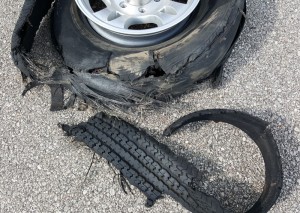Every driver knows this dreaded sound. If they haven’t heard it firsthand then I would consider them lucky. This is the horrid sound of a tire blowout while traveling down the road. To hear the stories of this when it happens to others is bad enough, but to actually experience it yourself is terrible. There is nothing worse than fighting with a large wheel, a small jack and lug nuts that are near impossible to break loose. All this while your rig is swaying back and forth as traffic zips past you at 70 to 80 MPH, only inches from your RV which luckily made it to the shoulder of the expressway. Sounds like a lot of fun doesn’t it?
 Most people never take the time to think how important tire maintenance is on a RV. On your car you just have the oil guy check the pressure when you have your oil changed. After all, you very rarely hear of tire blowouts on automobiles anymore. For this reason we sometimes neglect the tires on our rigs.
Most people never take the time to think how important tire maintenance is on a RV. On your car you just have the oil guy check the pressure when you have your oil changed. After all, you very rarely hear of tire blowouts on automobiles anymore. For this reason we sometimes neglect the tires on our rigs.
RV tires on the other hand are expected to carry a lot more weight and do a lot more work. When they fail they can fail in a BIG way. The event can cause vehicle damage, trailer damage, personal injury and even death. This is something we would all like to avoid.
Most preventable tire problems are caused by tire under inflation and over loading the tire. The likelihood of tire problems can also increase due to age and deterioration of the rubber.
I have tried to do my best to prevent tire problems. I always check the pressure before any trip. I inflate my tires to the max load pressure printed on my tires. To reduce weight, we carry only the bare minimum of gear that we will need during our trip. We only carry fresh water if it is absolutely necessary. We never over load our rig. When not in use I cover the RV wheels with covers to protect them from heat and sun.
We have had our rig weighed at Flying Js using their CAT scale. This assures us that the actual load weight of our truck and trailer stays well below our safe maximum load totals. The best method of determining how much load is applied to each wheel is by using separate wheel scales. However these types of scales can be somewhat difficult to find. I highly recommend that everyone have their rigs weighed, otherwise you have no idea how much weight you are really dealing with. It can be really easy to over-load a RV with water and gear.
With all the precautions I have taken, I am quite puzzled by all the problems we have had this year with our tires. Our RV is now just over 2 years old. I really don’t think we should be experiencing all the problems we have had. If you remember in this post, back in April we had the belts break on both tires of the rear axle on our fifth-wheel trailer. We were lucky to discover this before either of them had actually blown-up on the road. Last Sunday we weren’t so lucky. On our way home from a trip up north we had another one of the original four tires blow-up on us as we were traveling on the expressway.
Following this latest episode, I decided to do a bit of research. I contacted a variety of tire dealers, RV dealers and trailer manufacturers. I searched through countless online articles. I even read the entire blog at RV Tire Safety from the current post all the way back to his first post. I found this to be some of the most educational information on the web about tires. I am sure you will agree that Rodger knows a thing or two about tires. After I saturated my brain with all this information I still did not have a clue as to why I am having so many problems with my tires. I really do not feel as if I have neglected them in any way.
I hate to add to the “made in china” tire bomb hype but I think at this point it may be of some service to present you with the brands of tires I am dealing with. I really don’t know if one brand of tire is any better than another. Everyone I ask has their own personal opinion as to what brand is best.
Here are the brands of trailer tires we have owned so far.
- The tires on our 2006 Jayco fifth-wheel were ST225/75R15 Maxxis (2540@65), we had no problems with these tires except a nail we discovered in one that lost air over the winter.
- The tires that came originally installed on our current 2013 Jayco Eagle fifth-wheel trailer were ST235/80R16 Towmax (3520@80).
- The replacement tires I purchased to replace to first 2 failures on the rear axle were ST235/80R16 Omni Trail (3520@80).
- I have now replaced all 4 trailer tires with ST235/80R16 Maxxis (3420@80).
I am now hoping that this will be the last chapter in this saga. I can’t think of anything more I can do. I am now convinced that if there is any more to this story it will be attributed to some really BAD luck on our part.
Article Courtesy of : www.BugSmacker.com : Copyright © 2015
